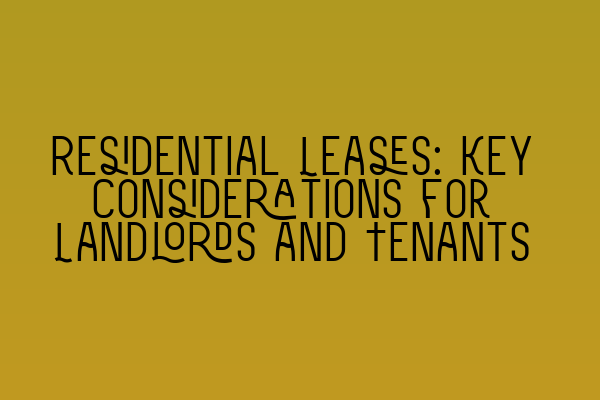Residential Leases: Key Considerations for Landlords and Tenants
Introduction:
Residential leases are a fundamental aspect of property law, governing the relationship between landlords and tenants. Whether you’re a landlord or a tenant, understanding the key considerations that come with residential leases is crucial to ensuring a smooth and mutually beneficial arrangement. In this blog post, we will explore the essential aspects of residential leases and provide valuable insights for both landlords and tenants.
1. Lease Agreement:
The lease agreement is the cornerstone of any residential lease, outlining the terms and conditions that both the landlord and the tenant must adhere to. It is a legally binding contract that encompasses key elements such as:
– Duration: The lease agreement specifies the duration of the lease, including the start and end dates.
– Rent: The amount of rent to be paid by the tenant, the payment frequency, and any additional charges or fees should be clearly stated.
– Maintenance and Repairs: The responsibilities of both parties regarding property maintenance, repairs, and reporting issues must be outlined.
– Security Deposit: The lease agreement should include details about the security deposit, including the amount, the reasons for withholding it, and the conditions for its return.
2. Rent Payments:
For tenants, understanding the importance of timely rent payments is crucial. Falling behind on rent can have serious consequences, including eviction. As a tenant, you should make sure to:
– Budget accordingly to meet your monthly rent obligations.
– Set up automatic payments or reminders to ensure timely payments.
– Communicate with your landlord if you encounter financial difficulties to explore possible solutions.
For landlords, having a clear rent collection process is vital. Key considerations include:
– Providing multiple payment options for tenants, such as bank transfer or online payment platforms.
– Documenting rental payments and keeping detailed records for tax purposes.
– Establishing a late rent policy and considering penalties for delayed payments.
3. Maintenance and Repairs:
The maintenance and repair responsibilities should be clearly defined in the lease agreement. Key points for both landlords and tenants include:
– Regular Inspections: Landlords should conduct periodic inspections to ensure the property is properly maintained and to address any potential issues.
– Reporting Maintenance Issues: Tenants should promptly report any maintenance or repair issues to their landlord to prevent further damage.
– Landlord’s Duty: Landlords have a legal obligation to carry out necessary repairs and ensure the property is in a habitable condition.
– Tenant’s Responsibility: Tenants are typically responsible for minor maintenance tasks such as changing light bulbs or keeping the property clean and tidy.
4. Termination and Renewal:
Understanding the termination and renewal process is crucial for both landlords and tenants. Key points include:
– Notice Period: The lease agreement should specify the required notice period for termination or renewal.
– Renewal Options: Tenants should be aware of their options to renew the lease or negotiate new terms before the current lease expires.
– Property Inspections: Landlords may conduct inspections prior to lease renewal to assess the property’s condition and address any concerns.
Conclusion:
Residential leases play a pivotal role in the landlord-tenant relationship, and understanding the key considerations is essential for a successful and harmonious arrangement. By paying close attention to the lease agreement, rent payments, maintenance responsibilities, and termination or renewal processes, both landlords and tenants can navigate the complexities of residential leases effectively.
For comprehensive preparation for the SQE exams, check out our related articles and courses:
– SQE 1 Practice Exam Questions
– SQE 1 Practice Mocks FLK1 FLK2
– SQE 2 Preparation Courses
– SQE 1 Preparation Courses
– SRA SQE Exam Dates
Remember, seeking professional legal advice is always recommended for specific lease-related queries or concerns.
